Of late we are noticing even more signs that my nephews (my sisters sons) miss our Dad and are sad he is no longer here. when our Dad passed away, my eldest nephew would wake up in the night crying saying he misses him. This would happen quite often during the first couple of months…..
We have decided to do this topic, as the loss that was suffered affected the whole family including my nephews. (My sister’s sons). Please see Children and Grief/Children Grief Awareness.
- Introduction
- Illustrative examples of children and grief
- Illustrative examples Children Grief Awareness month/week
- YouTube Video: Children and Grief
- Facebook: Children Awareness month
- Children and Grief
- Dealing with Children and Grief
- Explaining Death to a Child
- Affects of Death on a family
- Children Grief Awareness
- Further useful links: Grief and Children/Children Grief Awareness
- Our final thoughts
© Copyright 2019 Grief Probate Journey Blog *PLEASE NOTE THIS INFORMATION IS SOURCED FROM UK and AMERICAN WEBSITES* It is also based on our own experience. *We are not experts in this field, we are speaking purely on our own experience with information sought from the internet to give further examples.*
1. Introduction:
Of late we are noticing even more signs that my nephews (my sisters sons) miss our Dad and are sad he is no longer here.
when our Dad passed away, my eldest nephew would wake up in the night crying saying he misses him. This would happen quite often during the first couple of months.
My sister had to find a way to explain to him where Grandad was and why he wouldn’t be able to see him anymore. This was extremely difficult, even more so as he was only three years old at the time. He is now five years old, and he still misses him.
My sister would talk to him and say it’s okay for him to still talk to Grandad in the sky. He can say good morning, good night.
There was also a time when my nephew was eating and just started crying saying he misses and wants Grandad. My sister told him Grandad is watching over him and protecting him.
Another recent example, my youngest nephew out of nowhere started getting really upset. He was talking about Christmas and that we won’t be able to have it at Grandad’s house, and what is going to happen to Christmas, we won’t be able to have any food. It was so random, that it threw us off track, we had to think quickly to help to make him feel better.
It was really worrying seeing how sad he was, it was also upsetting to see this.
Although they are young, they feel things as well. My youngest nephew is now three years old; he didn’t have much time with our Dad as he was born in the year our Dad went into the hospital. My youngest nephew was 11 months old when our Dad passed away. Our Dad passed away three weeks before my youngest Nephew’s first birthday. Due to how young he was and the various infections our Dad had he wasn’t around my Dad much once he went into the hospital. My Dad only spent five proper months with him before falling ill and going into hospital.
And then there is my eldest nephew. The nephew who had such a strong bond with our Dad that I didn’t even realise myself. I saw it in pictures strongly once our Dad had passed away. These examples can be seen in our topic Background Story.
It is mentioned in the blog that my eldest nephew has so many characteristics and mannerisms just like our Dad. Since those times it is becoming more and more evident. He might come out with a one-liner, or it’ll be an expression on his face, his curiosity to know how things work and want to fix things, the way he dances, it’s so surreal. It really is bittersweet, we are so grateful to see these traits, but it also can’t help but make us feel we wish they had more time together. Our Dad would be so proud of his nephews, we know they would be making him grin from ear to ear with pride of the bright young boys they are. Even my youngest nephew is developing his own character and we are seeing traits of our Dad in him also.
just recently my youngest nephew started crying saying he wishes he knew Grandad. He said this to my sister. I can’t imagine how that must have made my sister feel. Hearing that is heart wrenching for me and I’m only the Aunty.
We are still so caught up and preoccupied with finalising Probate that it can cause us to lose sight of what’s going on in our surroundings . Despite this , we still try to keep the memory of our Dad alive. When my eldest nephew says or does something like our Dad we tell him:
- That’s just like Grandad
- Grandad would say something like that
At the same time, we don’t wont to go over the top in a way to possibly cause more upset (making him realise how much he misses him). But we notice when we tell him these things it makes him smile and he will do whatever it is even more. Also what ive noticed is, if we don’t acknowledge when he does these thing’s he notices and wants us to say something as you can see he’s waiting for us to say it.
2. Illustrative examples: Children and Grief
3: Illustrative examples: Children’s Awareness month/week
4. YouTube Video: Children and Grief:
4.1 Saying Goodbye – Dr Ranj speaks about children and grief
5. Facebook: Children Awareness Month
5.1 November is Children’s Grief Awareness Month- Facebook (NAGC National Alliance for Grieving Children)
6. Children and Grief
6.1 How Children Understand Death & What You Should Stay
“Children will be exposed to sickness and death at some point in their young lives because death is part of the natural cycle of life. Even young children who may not understand death react to grieving parents. Parents need to support children through the grieving process to help them resume their lives”.
6.2 At what age do children usually start to understand that death is a permanent state?
“Children begin to grasp death’s finality around age 4. In one typical study, researchers found that 10 percent of 3-year–olds understand irreversibility, compared with 58 percent of 4-year–olds. The other two aspects of death are learned a bit later, usually between age 5 and 7. (26 Jul 2013)”.
7. Dealing with Children and Grief
7.1 What factors influence children’s understanding of death?
“In general, children’s comprehension of death depends on two factors: experience and developmental level. Children’s experiences with death (i.e., actual experience and what they have been told about death) are critical to their understanding of it. (17 Jan 2013)”.
7.2 How can I help my child understand death?
Here are some things parents can do to help a child who has lost a loved one:
- “When talking about death, use simple, clear words”.
- “Listen and comfort”.
- “Put emotions into words”.
- “Tell your child what to expect”.
- “Talk about funerals and rituals”.
- “Give your child a role”.
- “Help your child remember the person “.More items…
7.3 Can a 2 year old understand death?
“Infants and toddlers do not understand death, but they can sense what their caregiver is experiencing. (11 Sep 2014)”.
7.4 Should children attend funerals?
“As a general guideline, children should be allowed to attend a wake, funeral and burial if they want to. Children should never be forced to attend a funeral or memorial service. It is important, however, to understand a child’s reasons for not wanting to attend so that their fears or questions can be addressed”.
8. Explaining Death to a Child
8.1 How do you explain death to a child?
“Here are some things parents can do to help a child who has lost a loved one”:
- “When talking about death, use simple, clear words”.
- “Listen and comfort”.
- “Put emotions into words”.
- “Tell your child what to expect”.
- “Talk about funerals and rituals”.
- “Give your child a role”.
- “Help your child remember the person”. More items…
8.2 Should a child view an open casket?
“For instance, if there will be a viewing with an open casket, the child needs to know that. The child also needs to know that it’s OK to touch their parent’s body, but they should not be made to do so. The child may want to give something to the parent, by putting it in the casket, the ground, or the cremation urn. (20 Mar 2015)”.
8.3 Should you bring a toddler to a funeral?
“It may be appropriate to bring a younger child to a funeral if he/she is the son or daughter of the deceased. … With the loss of a sibling, it usually is appropriate for children to attend the funeral. A child may in some way feel responsible for the sibling’s death or suffer from survivor guilt”.
8.4 How does a preschooler view death?
“Preschool-aged children may begin to understand that death is something feared by adults. This age group may view death as temporary or reversible, as in cartoons. … Their experience with death is influenced by those around them. They may ask questions about “why?” and “how?” death occurs”.
9. Affects on Death on a family
9.1 How does a death affect a family?
“Non-normative life events such as death of a family member which occurs through suicide, accidents, violence and other extremely aversive and sudden causes, including the death of pets can leave the family with overwhelming pain and grief. The array of emotional reactions to the loss of a loved one is known as grief”.
9.2 How can a death in the family affect a child’s development?
“A child’s understanding will depend on many things, including their age, stage of development, family background, personality and previous experiences. Children don’t all develop at the same rate – they’re individuals. Two children from the same family of the same age may react very differently to a death. (1 Mar 2019)”.
9.3 How do you prepare for a grandparent’s death?
“Preparing for Grief”
- “Build a network of caring people”.
- “Look after yourself physically”.
- “If possible, speak to your boss about having time off work or at least delegating some of your workload to a colleague”.
- “Prepare children by explaining the situation and how they are likely to feel at the time of the death and afterward”.
10. Children Grief Awareness
10.1 Children’s Grief Awareness Week Childhood Bereavement
Children’s Grief Awareness week 2019 will run from 15-21 November with the theme #LostforWords.
“The Week is a chance for us to come together to show our support for bereaved children across the UK. Organisations across the UK will be showing solidarity with grieving children, young people and their families in their community; raising awareness of their needs and how to help; and fundraising for their service”.
10.2 International Children’s Grief Awareness Day
“The Week will finish with Children’s Grief Awareness Day on 21 November, a global day designed to help us all become more aware of the needs of grieving children — and of the benefits they obtain through the support of others”.
11. Other useful links: Grief and Children/Children Grief Awareness
11.1 Children and Bereavement
- Supporting Bereaved Children and Young People |Child Bereavement UK
- How to Help a Child or Young Person |Cruse Bereavement
- How do I support a bereaved child? Sue Ryder
- Bereavement Reactions of Children and Young People By Age Group
- Children’s Grief |Cruse Bereavement Care
- Children and Bereavement – NHS
- Childhood Bereavement Counselling – Counselling Directory
- Bereaved Children – Maggie’s Centres
11.2 Children and Grief
11.3 Helping Children deal with grief
- Helping Your Child Deal With Death (For Parents) – KidsHealth
- Helping Grieving Children and Teenagers |Cancer.Net
- How to Help A Grieving Child |Grief Resources | The Dougy Center
- How Grief May Affect Children – Marie Curie
- Helping Children Cope With Grief |Child Mind Institute
- Child Grieving |How to Deal With Grieving | Helping Children with Grief
- How to Help Children Deal with Loss |Psychology Today
- Preparing a Child for Loss – Macmillan Cancer Support
- Manage Grief in a Healthy Way – Facty Health
- Helping your child remember someone who’s died -Marie Curie
- Questions Children May Ask – Marie Curie
- How to include a child in a funeral – Marie Curie
11.4 Talking to Children about Death
- The Do’s and Don’ts of Talking to With a Child about Death
- How Children Understand Death & What You Should Stay
- Talking to children about death – Marie Curie
- How to explain death to children and young people and help them cope
11.5 Children’s Grief Awareness
- Children’s Grief Awareness Day
- #RememberWhen for Children’s Grief Awareness Week
- About Children’s Grief Awareness Day
- Children’s Grief Awareness – National Bereavement Alliance
- Children’s Grief Awareness Week |Grief Encounter
11.6 Books on Children and Grief
- Amazon Grief and Children
- Amazon Grief and Children (Amazon Site)
- Amazon Site (Books) – Helping Children with Loss
11.7 Helping Children with the loss of a Grandparent
- When a Grandparent Dies Tip Sheet Revised
- Help Kids Cope With a Grandparent’s Death
- Grandma is dead: five tips for talking to children about death
- Ask the expert: my son (10) is struggling to with grief for his Grandad
- How to cope with the loss of a grandparent
- Help Children Deal With the Death of a Grandparent
- How to Deal With the Death of a Grandparent (with Pictures)
11.8 How Grief might affect Children
- How Grief May Affect Children – Marie Curie
- Loss from a Childs Perspective |Cruse Bereavement Care
- How Children Grieve – Persistent myths may stand in the way
12. Our Final Thoughts
We will try our very best to keep the memory of our Dad alive, whilst managing things as best as possible .
- This is all new to us.
- It’s a learning curve.
- It’s part of our journey.
There is no right or wrong way to do this, we will just continue trying our very best .

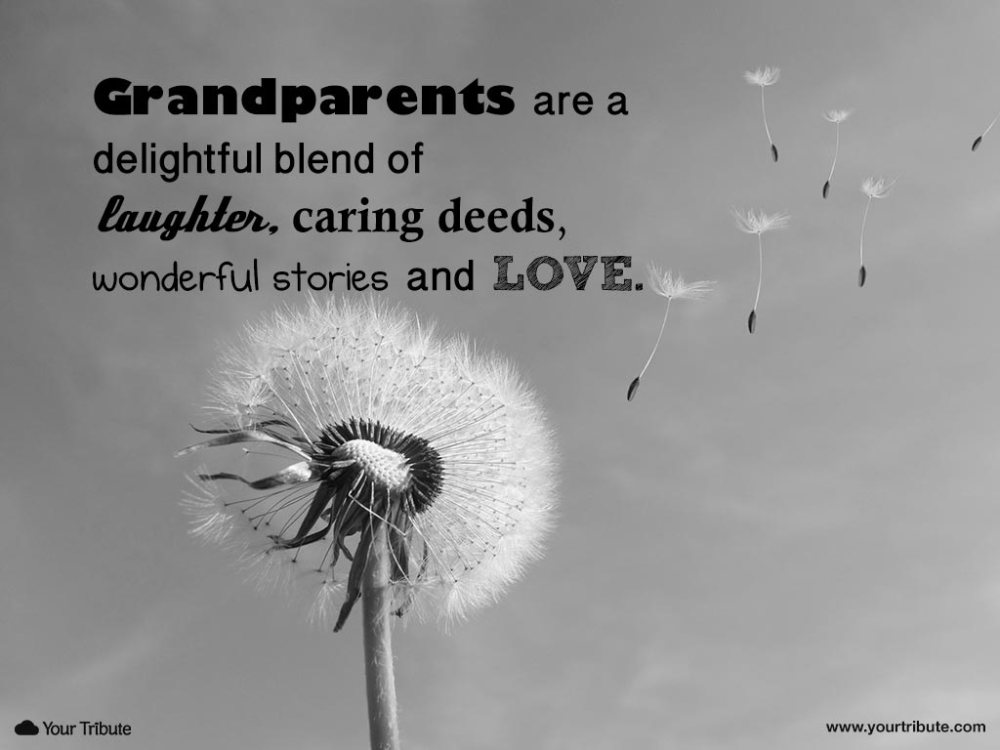
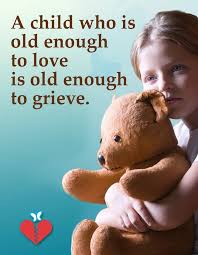
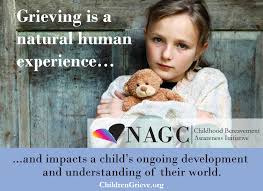



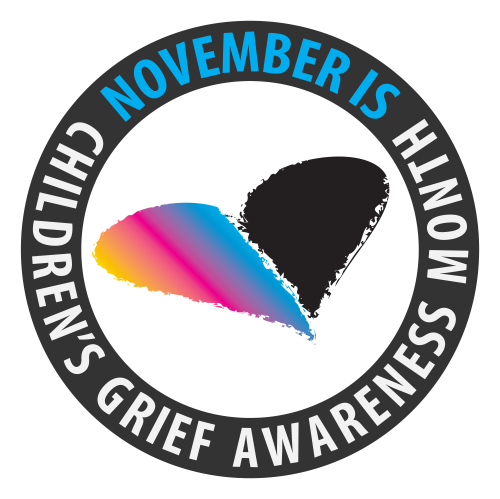
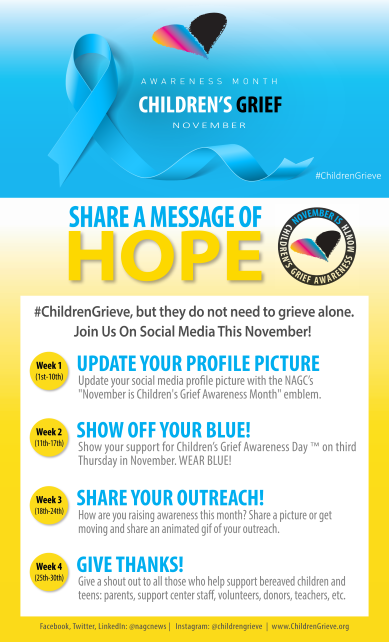
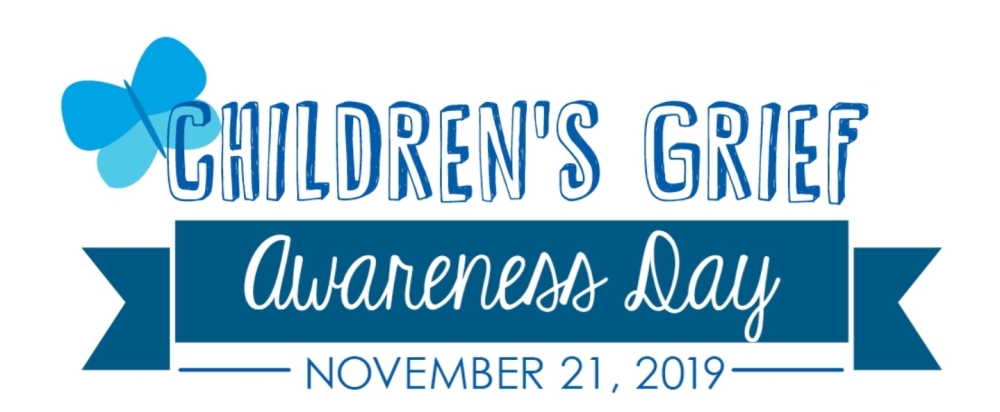
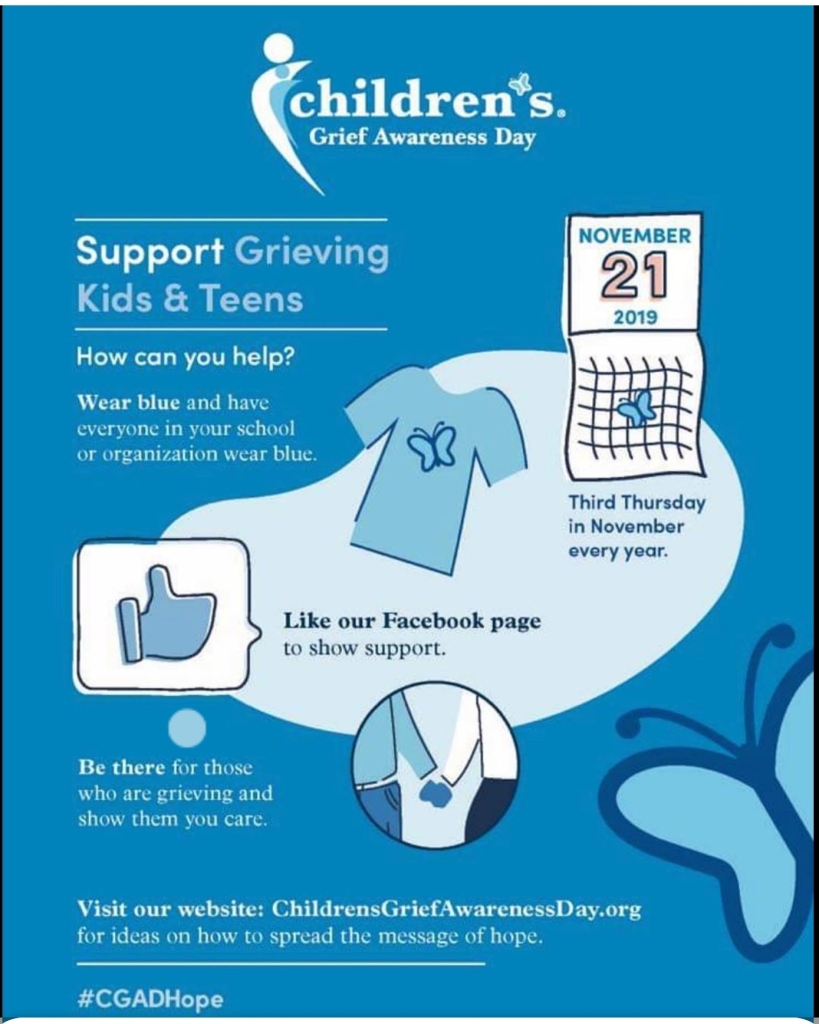
4 thoughts on “Children and Grief/Children Grief Awareness”